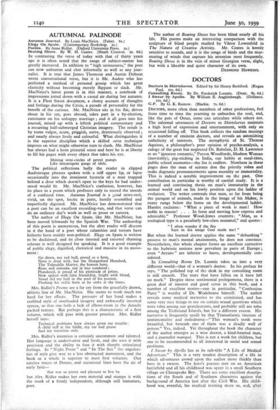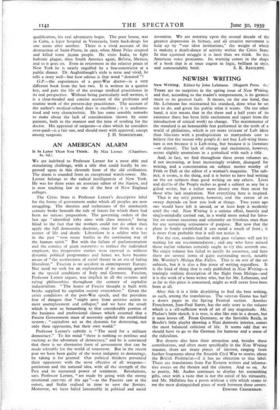DOCTORS
G.P. By G. K. Rainow. (Blackie. 7s. 6d.)
DOCTORS, more often than members of other professions, feel from time to time the yearning to unburden the soul, and, like the pots of Omar, some can articulate while others not.
The informal utterances of Doctors in Shirtsleeves maintain a high level of expression and entertainment, with only an
occasional falling off. This book collects the random musings of a number of eminent doctors, and reveals an astonishing catholicity of interests. The metaphysic of St. Thomas Aquinas, a philosopher's poor opinion of psycho-analysis, a eulogy of the great but neglected Dr. Rabelais, D. H. Lawrence as an " ignorant romantic," Parson Woodforde, Modem Woman (inevitably), pig-sticking in India, our habits at meal-time, public school memories—the list is endless. Nowhere in these
pages does the man of science don the priestly robes and make dogmatic pronouncements upon morality or immortality. This is indeed a notable improvement on the past. One contribution in particular is worthy of careful study. It is a learned and convincing thesis on man's immaturity in the animal world and on his lowly position upon the ladder of evolution. The writer contends that man, so far from being the paragon of animals, made in the image of his Maker, is many rungs below the horse on the developmental ladder. Hamlet exclaims: " What a piece of work is man! How noble in reason! . . . In form and moving how express and admirable." Professor Wood-Jones counters: "Man, as a zoological type is a peculiarly low-class mammal," and quotes:
" I often wonder if the flea Says in his image God made me! "
But when the learned doctor applies the same " debunking " process to man's mental attainments, he does not convince. Nevertheless, this whole chapter forms an excellent corrective to the hubristic notions now prevalent in parts of Europe ; even " Aryans " are inferior to hares, developmentally con- sidered.
In Consulting Room Dr. Loomis takes us into a very
different world—that of a woman's doctor. In his preface he says, " The polished top of the desk in my consulting room is still smooth. The tears that have fallen on it have left no mark." Despite these sentimental prolegomena, there is a great deal of interest and good sense in this book, and a number of excellent stories—one in particular, " Confession Party " is worthy of Dr. Wodehouse himself. The author reveals some medical mysteries to the uninitiated, and has some very nice things to say on certain sexual questions which were tabu among our grandparents, and probably still are tabu among the Trobriand Islands, but for a different reason. His narrative is frequently spoilt by that Transatlantic tincture of sentimentality and melodrama—" This woman's teeth were beautiful, but beneath one of them was a deadly well of poison." Yes, indeed. Yet throughout the book the character of the author emerges as a wise doctor, a kind-hearted man, and a journalist manqué. This is not a work for children, but one to be recommended to all interested in social and sexual problems.
I Swear by Apollo has as its sub-title "A Life of Medical Adventure." This is a very modest description of a life in which adventures crowd upon the author more thickly than bees in a swarm. The hero's parents met on an American battlefield and all his childhood was spent in a small Southern village on Chesapeake Bay. There are some excellent descrip- tions of the South and of Southern characters against the background of America just after the Civil War. His child- hood was eventful, his medical training more so, and, after qualification, his real adventures begin. The poor house, war in Cuba, a leper hospital in Venezuela, form back-drops for one scene after another. There is a vivid account of the destruction of Saint-Pierre, in 1902, when Mont Pelee erupted and killed some 30,000 people. He visits India, to fight bubonic plague, then South America again, Bolivia, Mexico, and so it goes on. Even in retirement in the relative peace of New York he is nearly engulfed by a boa-constrictor at a public dinner. Dr. Aughinbaugh's style is terse and vivid, he tells a story well—but how odious is that word "donated "!
G.P.—the experiences of a post-War doctor—is a very different book from the last two. It is written in a quieter key, and puts the life of the average medical practitioner in its real perspective. Without being particularly well written, it is a clear-headed and concise account of the problems and routine work of the present-day practitioner. The account of the author's medical-school days is excellent ; it is undrama- tised and very characteristic. He has some sensible remarks to make about the lack of consideration shown by some patients, both in the manner and the time of sending for the doctor. His appraisal of surgeons—a class which he considers over-paid—is a fair one, and should meet with approval, except











































 Previous page
Previous page